MercoPress. South Atlantic News Agency
Tag: Argentine peso
-
Friday, March 20th 2020 - 09:43 UTC
Argentina successfully rolls over local bonds in Pesos

Argentina’s economy ministry said on Thursday it had exchanged around 257 billion pesos (US$ 4 billion) in a debt swap for new instruments maturing between 2021-2024, as the government looks to restructure its debt amid a credit crunch.
-
Thursday, December 19th 2019 - 09:55 UTC
Riots, turmoil and the Argentine Peso, a tremendous toll for tourism in Chile
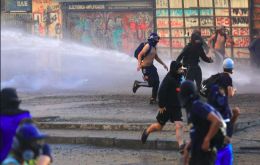
Research undertaken by ForwardKeys, the travel analytics firm, which analyses 17 million flight bookings and 7 million flight searches a day, has revealed that the recent riots in Chile have taken a tremendous toll on tourism to the country.
-
Thursday, October 24th 2019 - 09:55 UTC
Argentine markets concerned about what happens on Monday 28 October

Argentine markets are set for another bout of nerves after the country holds a presidential election on Sunday, likely to confirm defeat for business-friendly President Mauricio Macri.
-
Thursday, August 29th 2019 - 10:16 UTC
Argentina sells US$ 367m reserves to prop the Peso; country risk at another record level, 2.125 points
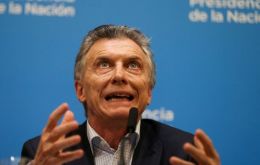
Argentina’s peso was battered on Wednesday as the central bank sold US$ 367 million of its dollar reserves in a second consecutive day of heavy intervention aimed at controlling the currency’s fall. Likewise the country risk rose 135 basis points to 2,125, its highest in 14 years, before partially recovering, according to the JP Morgan Emerging Markets Bond Index Plus.
-
Wednesday, August 28th 2019 - 09:59 UTC
Macri anticipates that Argentina's inflation will accelerate to 3% in August; country risk reaches 1.990 points

Argentine President Mauricio Macri said that monthly inflation would accelerate to 3% in August following a slump in the peso, as the central bank intervened heavily in the market on Tuesday to prop up the local currency.
-
Wednesday, August 28th 2019 - 09:49 UTC
Argentina sold US$ 302 million to support the Peso, exceeding an IMF agreement
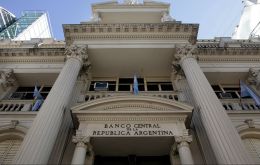
Argentina's central bank on Tuesday exceeded for the first time a guideline on reserve sales agreed as part of its US$ 57 billion standby agreement with the International Monetary Fund, selling US$ 302 million in the foreign exchange market, traders said.
-
Monday, August 12th 2019 - 20:18 UTC
A Monday of financial turmoil in Argentina as markets digested Sunday's primary results

Argentina's currency collapsed 30.3% to a record 65 Pesos to the US dollar while government bonds sold off steeply on Monday after the country’s market-friendly, President Mauricio Macri, performed worse than expected in Sunday primary elections.
-
Wednesday, May 8th 2019 - 12:54 UTC
IMF mission arrives in Argentina: Central bank policy, inflation and revenue in the agenda

A new IMF mission is expected in Argentina this e Wednesday for the fourth review of the country's economic plan which is supported by a 36 month stand-by credit from the multilateral financial institution. It's the first IMF visit since Argentina's Central Bank major strategy change in the foreign exchange market to avoid another meltdown of the Argentine currency.
-
Tuesday, April 30th 2019 - 09:59 UTC
Argentine Peso gains strength as IMF agrees to more central bank flexibility
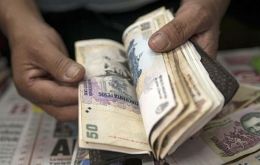
Argentina’s embattled peso gained strength on Monday after the central bank said it would ease limits on its foreign exchange market interventions, signaling its willingness to sell reserves in an effort to better control the volatility of the local currency. The peso began the session up 3.37% and closed 3.56% stronger at 44.37 per U.S. dollar.
-
Saturday, April 27th 2019 - 11:30 UTC
A week of volatility in Argentina ends with the Peso down 8.81%
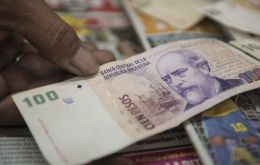
Argentina’s peso fell back on Friday afternoon to post a record low close, giving up earlier gains after a tumultuous week that saw the currency battered to its weakest ever level and local debt pummeled as anxious investors fled.
